
The Decembrist Revolt took place in Russia on 26 December [O.S. 14 December] 1825, following the sudden death of Emperor Alexander I.
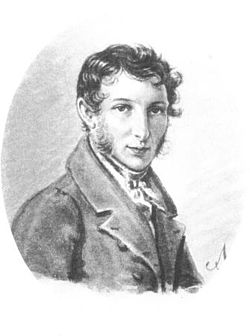
Prince Sergei Petrovich Trubetskoy was one of the organizers of the Decembrist movement. Close to Nikita Mikhailovich Muravyov in his views, he was declared the group's leader on the eve of the December 26 uprising in 1825 but failed to appear, and instead sought refuge in the Austrian embassy.

Kondraty Fyodorovich Ryleyev, also spelled Kondraty Feodorovich Ryleev was a Russian poet, publisher, and a leader of the Decembrist Revolt, which attempted to overthrow the Russian monarchy in 1825.

Colonel Pavel Ivanovich Pestel was a Russian revolutionary and ideologue of the Decembrists.
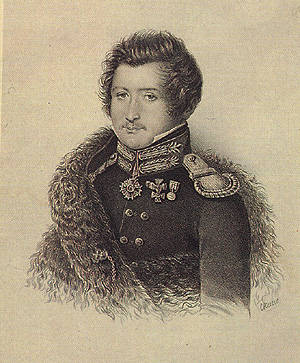
Sergey Ivanovich Muravyov-Apostol was a Russian Imperial Lieutenant Colonel and one of the organizers of the Decembrist revolt.
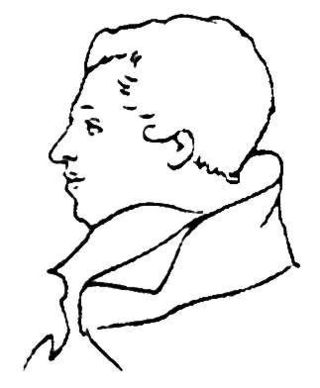
Mikhail Pavlovich Bestuzhev-Ryumin was a Russian officer, one of the organizers of the Decembrist revolt. He was the youngest of the five hanged Decembrists.
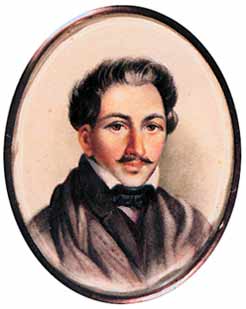
Pyotr Grigoryevich Kakhovsky was a Russian officer and active participant of the Decembrist revolt, known for the murder of General Mikhail Miloradovich and Colonel Ludwig Niklaus von Stürler.
The Senate Square can refer to several squares depending on the city:

The English Embankment or English Quay is a street along the left bank of the Bolshaya Neva River in Central Saint Petersburg. It has been historically one of the most fashionable streets in Saint Petersburg, and in the 19th century was called by the French term, Promenade des Anglais. It was from the English Embankment that at 2 am on October 25, 1917, the gunshot from the Aurora sent the signal to storm the Winter Palace during Russian Revolution.

Senate Square, formerly known as Decembrists' Square from the 1920s to 2008, and (formally) as Peter's Square, from 1782 to 1925, is a city square in Saint Petersburg, Russia. It is situated on the left bank of the Bolshaya Neva, in front of Saint Isaac's Cathedral. In 1925 it was renamed Decembrists' Square to commemorate the Decembrist Revolt, which took place there in December 1825.

The Monument to Nicholas I is a bronze equestrian monument of Nicholas I of Russia on St Isaac's Square in Saint Petersburg, Russia. It was created by French sculptor Auguste de Montferrand and unveiled on July 7 [O.S. June 25] , 1859, the six-meter statue was considered a technical wonder at the time of its creation. It is one of only a few bronze statues with only two support points.

Yuri Alexandrovich Shaporin, PAU, was a Soviet composer.

Dekabristov Island, known prior to 1926 as Goloday Island is an island in Vasileostrovsky District of Saint Petersburg, Russia, to the north of Vasilyevsky Island, separated from it by Smolenka River.

The Russian interregnum of 1825 began December 1 [O.S. November 19] with the death of Alexander I in Taganrog and lasted until the accession of Nicholas I and the suppression of the Decembrist revolt on December 26 [O.S. December 14]. In 1823 Alexander secretly removed his brother Constantine from the order of succession, after Constantine informed Alexander he had no intention of ruling the Empire, and appointed Nicholas heir presumptive. This unprecedented secrecy backfired with a dynastic crisis that placed the whole House of Romanov at peril. Only three men, apart from Alexander himself, were fully aware of his decision, and none of them was present in the Winter Palace when the news of Alexander's death reached Saint Petersburg on December 9 [O.S. November 27] 1825.

The Chernigov Regiment revolt was the second and the last major armed conflict of the Decembrist revolt in the former Russian Empire. The revolt unfolded January 10 [O.S. December 29] – January 15 [O.S. January 3] 1826 in Ukraine between Kiev and Bila Tserkva.
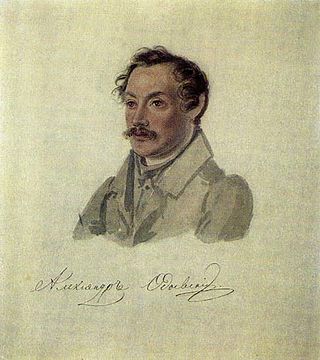
Alexander Ivanovich Odoevsky was a Russian poet and playwright, one of the leading figures of the 1825 Decembrist revolt. One of Odoevsky's lines, "Iz iskry vozgoritsa plamya", has come down in history as a long-lasting slogan of the Russian revolutionary movement. It was chosen as a motto for the Lenin-founded newspaper Iskra, also giving the magazine its title, which means "spark".

Nikita Mikhailovich Muravyov was an Imperial Guards staff officer and plotter in what led to the Decembrist revolt of 1825.

Union of Salvation is a 2019 Russian war epic period adventure film directed by Andrei Kravchuk, written by Nikita Vysotskiy and Oleg Malovichko, and produced by Konstantin Ernst. The film was created in collaboration with the Cinema Direction Studios with Mosfilm Studios and Lenfilm with the support of the Russian state Cinema Foundation.
A Dekabrist ("Decembrist") was a participant in the Russian Decembrist revolt of 1825.

The Decembrists is an historical opera by Yuri Shaporin with libretto by Vsevolod Rozhdestvensky, Aleksey Tolstoy and others. It was premiered in 1953 after a long and difficult period of composition lasting some 30 years. In a style highly reminiscent of the great 19th-century Russian composers, especially Borodin, Mussorgsky and Tchaikovsky, it gives a rather fictionalized account of the 1825 Decembrist revolt of Russian army officers against the Tsarist government. Frequently performed in the Soviet Union, where it was seen as the culmination of Shaporin's career, it has never been well known in the West except through its most popular number, the Soldiers' Chorus.

















